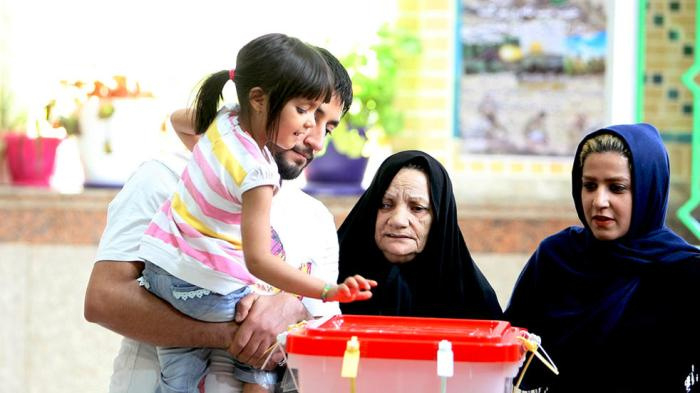Iranians Vote in the Second Round of Parliamentary Elections

(Family business: casting vote in a constituency in west of Tehran Province. Photo: Seyyed Ahmad Kiaei/Borna)
While in Tehran citizens are enjoying the last hours of their weekend, in 55 constituencies across the country, Iranians are voting to send the remaining 68 candidates to the Tenth Parliament in Baharestan, central Tehran.
With political boundaries becoming blurred, and MPs occasionally switching allegiance, there is still no clear picture of the political composition of the Tenth Parliament. The question of who won the first round of the parliamentary elections is also contested, since Reformist and Principlist media are both trying to designate independent electoral winners as members of their own camp. Undemarcated camps also mean that the next parliament may witness the most intense lobbying of its 37-year history.
Four main categories, i.e. Reformist proper, Principlist, pro-government and independent ran for the parliamentary elections, the first round of which was held in February. Predictably, independents may bend towards the government of Hassan Rouhani who can help them reinforce their social base in their constituency with further investment and facilitation of civil and industrial processes as reward.
For the Reformists, the first round of elections bore a true feel-good moment, despite unforgiving disqualification of their key figures by the Guardian Council, as through unprecedented solidarity both among the candidates on the slate and their voting base, they made a sweeping victory in Tehran, securing all 30 seats of the most influential constituency in the first round.
Reformists also secured a major victory in another major city, the industrial city of Isfahan, where the voters have recorded a pattern of voting that tilts towards the Principlists. Their Isfahan party, however, was spoiled, when in an unprecedented move, one candidate of the Reformist team, the female Minoo Khaleghi, was disqualified 'after' securing the necessary votes, for reasons not clearly disclosed. Hassan Rouhani has criticized the decision, yet up to now the fate of the one remaining seat in Isfahan is not clear.
For the last couple of weeks, Mohammad-Reza Aref, top MP-elect from Tehran and the de facto leader of the next Reformist bloc in the parliament, has been touring around the country, inviting the voters to vote for Reformist and pro-government candidates. Although outside major cities the voting pattern may be less influenced by the political agenda than by ethnic or familial affiliations and the ability to bring welfare and employment for the city, his campaign seems to have raised concern inside the Principlist camp. In Tabriz, center of Eastern Azerbaijan Province, in an amateur move the Principlist candidates copied the Reformists' poster design and even motto, i.e. Gaam-e Dovvom, the second step, in a bid to gain more votes.
The voting centers will close by 1900 local time, and announcement of the results will start from 2400. A more understanding, cooperative parliament may help the embattled Hassan Rouhani who is struggling hard to revive Iranian economy after the nuclear deal, while a belligerent Majles can bog down Hassan Rouhani and realize the dream Principlists have been harboring since his day one in office: to turn the right-wing cleric into the first single-term president of the Islamic Republic.

